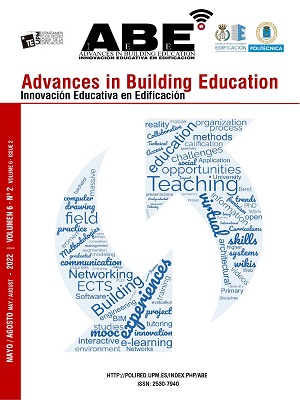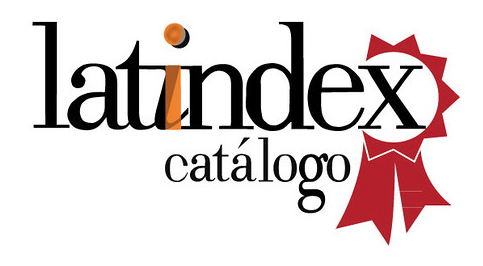Updating of contents in university teaching
DOI:
https://doi.org/10.20868/abe.2022.2.4942Palabras clave:
Content update, Open surveys, Didactic dimensions, Didactic coordination, Educate professionalsResumen
As a result of the integration of the university system in the European Higher Education Area in 2010, competences, methodology and evaluation have attracted the attention of researchers in the field of university teaching, while the contents have been relegated to a background. The present research aims to find out whether the contents that are taught respond to the changing demands of society or, otherwise, remain static and may become obsolete. The compulsory subject "Facilities Project" of the Degree in Fundamentals of Architecture at the Polytechnic University of Madrid is chosen as a case study. For this, an open survey is carried out to the students who take it in two successive years. As it is an open survey, students are offered a greater opportunity to express freely, both their answers and the reasons they have forgiving them. It is detected that they positively value much of the content and that they also value, to a lesser extent, other content negatively. Different evaluations are collected for each of the topics that make up the subject and also the reasons that, together with the suggestions, allow measures to be taken to improve the content offered. It is concluded that the contact with the opinion of the students allows obtaining a valuable point of view when keeping the contents updated.Descargas
Referencias
Sáez-Pérez, MP (2018). Teaching innovation and profession. Active skills and methodologies in technical areas. Advances in Building Education, 2(3), 45-64. https://doi.org/10.20868/abe.2018.3.3832
Porlan, R. _ (Cood.) (2017). University teaching. How to improve it. Madrid: Morata.
Rojo, Á., Jiménez, EG, Flores, JG, & Rodríguez, SR (2004). University teaching. Planning and development of teaching. Madrid: EOS.
Reynoso Flores, M., Alonso Gatell, A., & Pérez Ramírez, E. (2018). The environmental professional competences in the architecture student. Transformation, 14(3), 371-383.
Millán-Millan, PM (2020). On the house from home: new teaching experience in the Architecture Workshop subject. JIDA'20. VIII Conference on Educational Innovation in Architecture, Malaga, eAM'-UMA, November 12-13, 2020, pp. 37-45. DOI: 10.5821/jida.2020.9288
Fontàs-Serrat, J. & Estebanell-Minguell, M. (2020) Construction learning through the analysis of photographs of buildings. Architecture texts teaching and innovation JIDA 7, pp.83-99.
Ruesgas, LG, Gual, FV, Torrecillas, C., & Vázquez, AV (2020). Technological Proposals for self-assessment of 3D modeling exercises. Advances in Building Education, 4(2), 42-59. https://doi.org/10.20868/abe.2020.2.4463
Corcuff, P. (2008). The new sociologies. Constructions of social reality. Madrid: Alliance.
Simonton, D.K. (2003). Creative cultures, nations, and civilizations. In Paulus, PB & Nijstad, BA (Eds.), Group creativity: Innovation through collaboration. New York: Oxford University Press, pp 304-325. https://doi.org/10.1093/acprof:oso/9780195147308.003.0014
Jarauta, B. & Medina, JL (2012). Teaching knowledge and university teaching. Educational Studies 22, 179-198.
Knight, P. (2005). Higher Education teachers. Training for excellence. Madrid: Narcea.
Tardif, M. (2004). Knowledge of teachers and their professional development. Madrid: Narcea.
Marugán, M., Martín, LJ, Catalina, J., & Román, JM (2013). Cognitive strategies of elaboration and nature of the contents in university students. Educational Psychology, 19(1), 13-20. https://doi.org/10.5093/ed2013a3
Coll-López, J. (2020) What should we be teaching in architecture? four c. Architecture texts teaching and innovation JIDA 7, pp.100-117.
González MV & Cabrera CI (2013) Strategic learning at the university: subject proposal for the optional/elective curriculum. Journal of Pedagogy 34(94), 261-281.
Blunt, H. L. (1998). The methodology of the survey. In Cáceres, LJ (Coord.) Research techniques in society, culture and communication. Mexico: Logman, pp. 33-73
Descargas
Publicado
Número
Sección
Licencia
ABE (Advances in Building Education / Innovación Educativa en la Edificación) no aplica cargo alguno a los autores por procesar o publicar un artículo y provee acceso abierto (Open Access) inmediato a su contenido. Todo el contenido está disponible gratuitamente sin cargo para el usuario o su institución. Se permite a los usuarios leer, descargar, copiar, distribuir, imprimir, buscar o vincular a los textos completos de los artículos, o utilizarlos para cualquier otro propósito lícito, sin pedir permiso previo del editor o el autor. Esto está de acuerdo con la definición de acceso abierto de la BOAI.
1. Los autores conservan los derechos de autor y garantizan a la revista el derecho de una Licencia Creative Commons Atribución / No Comercial / No Derivadas 4.0 Internacional (CC BY NC ND) que permite a otros compartir el trabajo con un reconocimiento de la autoría y uso no comercial.
2. Los autores pueden establecer por separado acuerdos adicionales para la distribución no exclusiva de la versión de la obra publicada en la revista (por ejemplo, situarlo en un repositorio institucional o publicarlo en un libro).
Salvo indicación contraria, todos los contenidos de la edición electrónica se distribuyen bajo una licencia de uso y distribución “Creative Commons".














